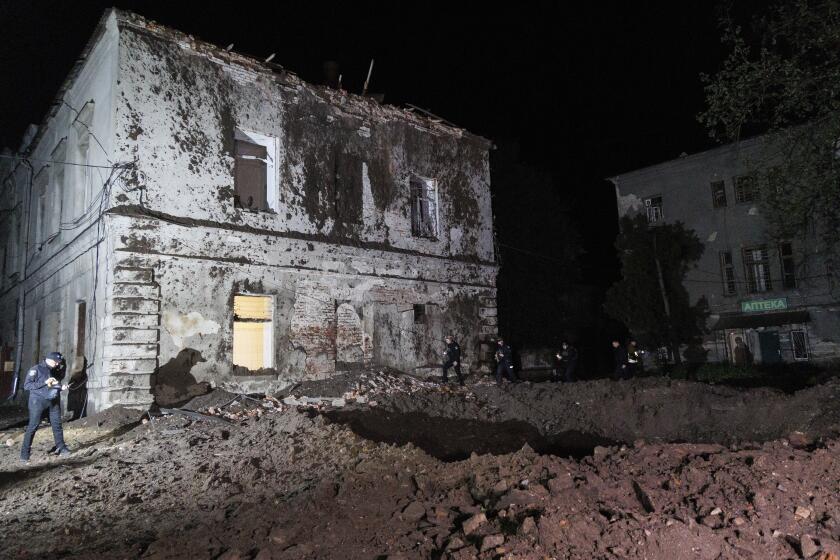Minnesota Town Sees China as a Big Ally
Many Americans fear the loss of jobs -- and entire industries -- to China. But people in this small town south of the Canadian border say they owe their livelihoods to the Asian nation.
Thanks to a hefty investment from China, the town’s leading employer was able to reopen its doors, putting more than 400 people back to work just before Christmas in 2003. The resurrection of the Evtac iron ore mine has provided a boost for this struggling northeast Minnesota community, whose main street boasts the world’s biggest hockey stick, a nod to the town’s role as the birthplace of American hockey.
“I can lay in bed and hear the trains running again,” said Mary Baratta, 49, the owner of a small cafe specializing in Cornish pasties, boiled cabbage and other European specialties. “It’s comforting, knowing people are going back to work.”
In just two years, Minnesota’s Iron Range, where the year’s biggest holiday is opening day of deer hunting season, has gone from bust to boom, propelled by automakers and construction companies in Beijing, Shanghai and Laiwu City, the home of Eveleth’s corporate savior.
Eveleth’s embrace of China is a far cry from the furor that erupted last year when Congress blocked China’s bid to take over El Segundo-based Unocal Corp., citing security concerns. Wary U.S. politicians have thwarted efforts by Chinese firms to take over a facility in the Port of Long Beach and purchase a U.S. airplane parts supplier.
But Minnesota Gov. Tim Pawlenty and others have put out the welcome mat for China. Last year the governor took a 200-person trade mission to Beijing, saying his state should serve as a model for Chinese companies seeking to expand into sometimes hostile U.S. territory.
Even leaders of the United Steelworkers of America acknowledge that the Chinese have been good for the state’s $2-billion mining industry, though they remain strong critics of China’s low wages and repression of organized labor.
“When the China boom started, we were resurrected,” said Joe Strlekar, who was Local 6860 president when Laiwu Steel Group -- one of China’s largest steel companies -- became a partner in the failed Evtac iron ore mine, which was owned by Eveleth Mines.
Someone driving into Eveleth, past the turnoff to the U.S. Hockey Hall of Fame and the sign advertising “live bait -- shiners, grubs, crawlers, leeches,” would be hard-pressed to find any evidence of Eveleth’s biggest foreign benefactor.
The only evidence of Chinese involvement in the mine, now called United Taconite, is the sign outside the gate, which bears Laiwu’s name alongside that of its U.S. partner, Cleveland-Cliffs Inc., the largest producer of iron ore pellets in America.
There are no Chinese living in this small town (population 3,713 and shrinking) or working at the decades-old facility. You can’t even get Chinese food here -- the nearest Chinese restaurant is in a neighboring town.
But people in Eveleth know their fates are increasingly tied to a country half a world away, where each day thousands of construction cranes lift tons of steel to make rows and rows of skyscrapers.
Triggered by China’s seemingly inexhaustible demand for steel, the price of iron ore has jumped 144% over the last three years, and that country’s biggest steel mills recently agreed to a 19% increase in prices for 2006.
That demand for iron and other ore has fueled several hundred million dollars in new investment in the Minnesota mining industry in the last year. The backers of a proposed $1.6-billion steel mill are talking to investors from China.
The biggest fear in these parts is not a Chinese invasion but a retreat. If China’s economy slows, its mills might start exporting steel, which would put pressure on the U.S. plants that are the key customers for Minnesota ore. Latin American mines might also send more steel to the U.S.
“Right now we’re in a very good place from global demand,” said Sandy Layman, the commissioner of Iron Range Resources, a state agency responsible for regional development. “We don’t know how long that will last.”
Minnesota’s Iron Range, which stretches across a sparsely populated region of lush forest and fish-filled lakes, has a long history of global connections. When iron ore was first discovered in the 1800s, the mine owners imported cheap labor from Finland, Germany and other parts of Europe to do the backbreaking and often dangerous work. (You might not find Chinese food, but even the tiniest towns offer pasties, Italian fruit cake and Slovenian cabbage rolls.)
In the late 1990s, a global glut of steel and plummeting prices led many steel companies to sell or close their iron ore mines. To cut costs, mines brought in technology that allowed them to produce more ore with fewer people. Mining employment plunged from 16,000 to 4,000.
Without China, Evtac, which was owned by two American companies and a Canadian partner, might have joined many of the region’s other shuttered mines, several of which have reopened as tourist attractions.
The mine has a less-than-illustrious past. In the mid-1980s a group of female miners claimed they had been threatened with pornographic graffiti and physical assaults. Those complaints led to the nation’s first sexual-harassment class-action suit. That dark period in the mine’s history, which occurred under a previous set of owners, put an uncomfortable Eveleth into the spotlight after the episode was made into a 2005 movie, “North Country,” starring Charlize Theron.
In the spring of 2003, Evtac President Howard Hilshorst was approached by Laiwu Steel Group about buying pellets. That wouldn’t be possible given the mine’s imminent demise, the executive explained, but would the Chinese want to buy the entire operation instead?
Hilshorst turned to Democratic Rep. James Oberstar, who grew up on the Iron Range. The Minnesota congressman welcomed the chance to attract capital to the U.S. from China, particularly if it restored good jobs and helped offset the massive trade deficit with China.
“If it keeps jobs here, it’s good,” he said.
Over the years, Oberstar had been an ally of the iron ore industry, supporting tariffs on imported steel and fighting U.S. aid to a Brazilian ore project that would compete with U.S. producers.
But on the range, people thought Oberstar was crazy to bring in the Chinese.
“Growing up in Duluth, when you were digging a hole, your parents would ask, ‘Are you digging a hole to China?’ ” said Peter Kakela, an iron ore expert at Michigan State University. “During that summer of 2003, I kept thinking, ‘Oberstar is trying to dig to China.’ ”
Prodded by Oberstar, the steelworkers union backed the Cleveland-Cliffs/Laiwu deal after getting assurances that there would be no significant changes in the mine’s operation or its labor relations.
The deal the congressman helped broker was unusual. Cleveland-Cliffs and Laiwu bought the shuttered mine out of bankruptcy protection for $3 million in cash and the assumption of $40 million in environmental liabilities. The Cleveland-based company, which has a 70% share, agreed to manage the mine. Laiwu signed a 10-year contract to buy 30% of the pellets, assuring the mine a stable customer base.
To cut transportation costs, Cleveland-Cliffs orchestrated a three-way trade. Laiwu’s share of the United Taconite pellets would be traded for pellets from a mine in eastern Canada that is partially owned by Cliffs. The Canadian pellets would be shipped to Laiwu’s facility in China.
The timing couldn’t have been better for the new owners, which have spent more than $50 million to modernize and expand the mine. The deal has given Cleveland-Cliffs, which operates six mines in North America, a toehold in China’s booming market. Last year the company spent $460 million to buy an 80% share in an Australian iron ore mine, largely to serve China.
At a time of skyrocketing prices, the deal provides Laiwu with a secure supply of ore and a window into how American business operates. Simon Shi, Laiwu’s representative in Los Angeles, is involved in all major decisions at the mine, including budgeting, and visits the mine at least once a year. Shi declined to be interviewed for this story.
With two kids in college and another heading that way soon, Paul Horoshak said he felt lucky to be back at work. The 47-year-old mechanic, who works on United Taconite’s 240-ton mining trucks, said it didn’t really matter who signed his paychecks as long as they respected the American way of doing business.
“I know the way the Chinese treat their workers in their country,” said the third-generation miner. “If they tried to do that here, I wouldn’t work for them. But I haven’t seen a change.”
More to Read
Start your day right
Sign up for Essential California for news, features and recommendations from the L.A. Times and beyond in your inbox six days a week.
You may occasionally receive promotional content from the Los Angeles Times.






